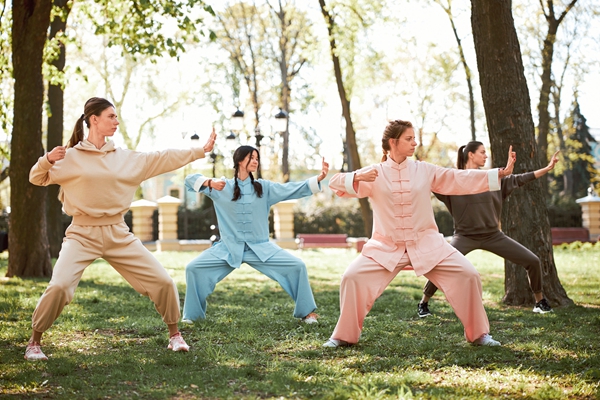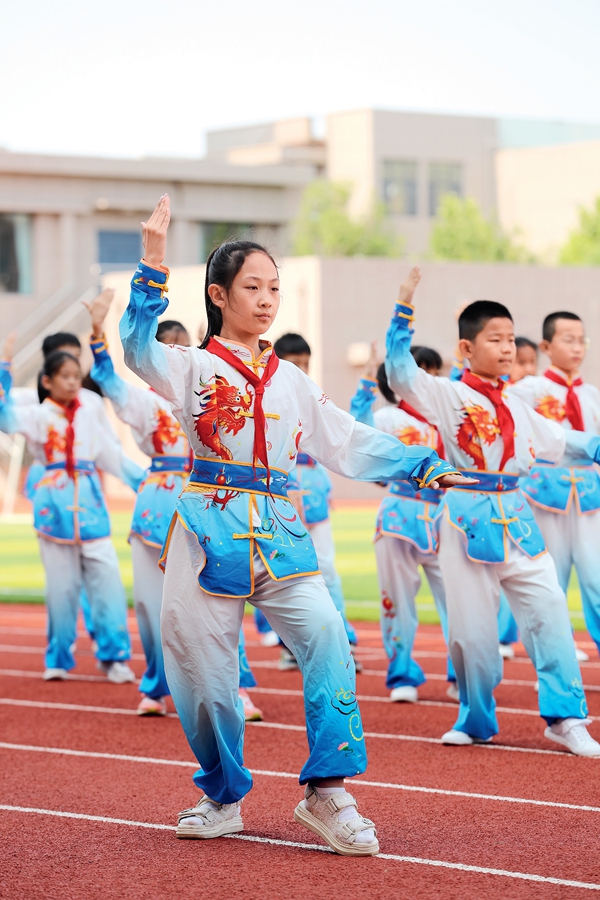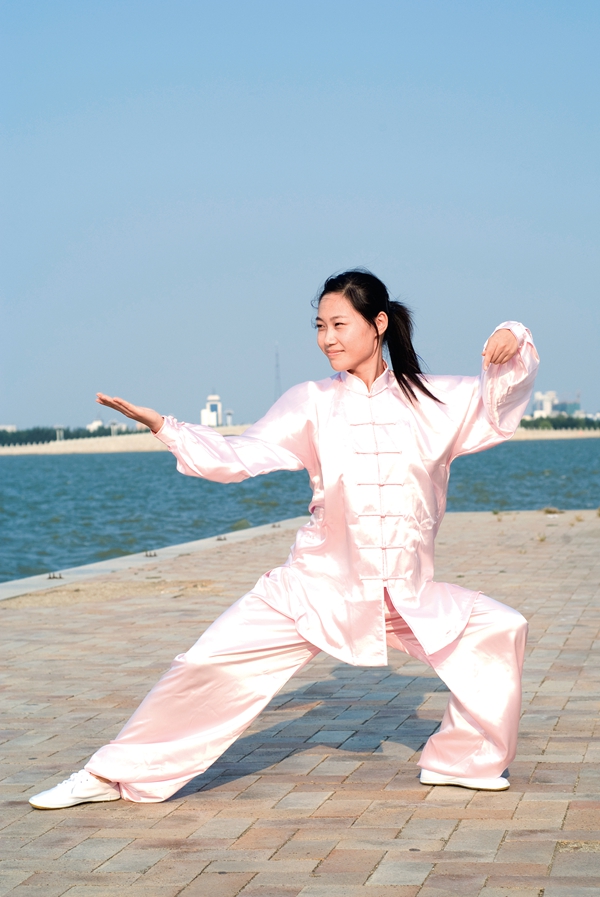Tai Chi Embodies Wisdom of Traditional Chinese Culture

Tai chi, or traditional Chinese shadow boxing, is a form of martial arts, the practice of which is characterized by slow, light movements and the use of the mind, as opposed to unnecessary or brute force. When one practices tai chi in a tranquil environment, he/she will achieve harmony of body, mind and soul, and that will help him/her cultivate his/her mind and develop his/her character. By observing the elegant movements, one may get a glimpse into Chinese people's ethics, and their philosophy of the unity of people and nature. In December 2020, the United Nations Educational, Scientific and Cultural Organization (UNESCO) added tai chi to its list of items of intangible cultural heritage.

Tai chi is one of the greatest gifts China has to share with the world. Shadow boxing, which involves the art of nurturing and the science of power, integrates the wisdom of traditional Chinese culture.
Tai chi, an ancient, meditative form of exercise, began in China as one of the martial arts. During the mid-17th century, Chen Wangting, a martial arts master in Chenjiagou (a village in Jiaozuo, a city in Central China's Henan Province), developed the form of boxing based on Yi Jing (Book of Changes, one of the Confucian classics) and TCM (traditional Chinese medicine) theories. Throughout the centuries, tai chi has evolved into a popular sport. Nowadays, people of all ages, and of various ethnic groups, practice tai chi. In May 2006, China added tai chi to the list of the country's items of intangible cultural heritage.

Perfect Exercise for Mind, Body, Soul
The basic movements of tai chi are based on wubu (five steps) and bafa (eight techniques), with a series of routines, exercises and tuishou (hand-pushing skills performed with a counterpart) added into the mix. Numerous practitioners, across the world, claim to receive various physical, personal and spiritual health benefits from practicing tai chi. Medical studies indicate the major health benefits of tai chi include improved heart and lung functions, a greater energy level, and better concentration, sleep and digestion.
Also, the "gentle form of exercise" can help one maintain strength, flexibility and balance. Tai chi synthesizes physical dexterity and mental agility. Traditionally, yin and yang are used to describe how seemingly opposite or contrary forces are interconnected and interdependent in the natural world, and how they give rise to each other as they interrelate. Through the balance of yin and yang, tai chi helps one build his/her body, cultivate his/her mind and develop his/her character. Tai chi is often described as "meditation in motion," but it might well be called "medication in motion." There is growing evidence the mind-body practice, which originated in China as a martial art, has value in treating or preventing many health problems. Tai chi is a wonderful sport for both men and women, of all ages, as it helps improve overall health, appearance and psychological well-being.

However, tai chi is more than a form of exercise — it represents a way of life. In December 2020, tai chi was inscribed on UNESCO's Representative List of the Intangible Cultural Heritage of Humanity. On UNESCO's website, the traditional physical practice is "characterized by relaxed, circular movements that work in concert with breath regulation, and the cultivation of a righteous and neutral mind."
Health Benefits
Given the marked curative effects, tai chi has become a "magic weapon" used by many women, who are trying to stay fit and/or enhance their beauty. Moreover, one can do tai chi at virtually any time or place. No wonder so many women, around the world, have "fallen in love" with the sport. Shadow boxing provides the following health benefits:

Strengthening the waist, legs and cervical vertebra. Medical studies indicate tai chi helps cure lumbago, leg pains and bone diminution, all of which are diseases that afflict elderly and middle-aged women. While performing tai chi, one must often balance on one leg, and then bend the leg to bear the body's weight, which strengthens the bones in the leg. Tai chi movements also enhance a woman's ability to balance, and help strengthen her waist and cervical vertebra;
Improving the functions of the reproductive system. Rotating the waist during tai chi is similar to "massaging" the kidneys, the gate of vitality (the acupuncture point that lies between the kidneys), and the belt vessel (the body part that starts between the second and the third lumbar vertebrae, and circles around the waist). This will improve the functions of the woman's reproductive system;
Improving mental well-being. As tai chi requires one to stay calm and focus on his/her movements, the exercises will help one eliminate his/her negative emotions, such as impatience, anxiety and irritation. By practicing tai chi frequently, a woman can remain calm, optimistic and easygoing; and
Improving appearance. Saliva contains various nutrients, all of which are good for one's health. In particular, saliva plays a major role in improving one's appearance, especially when one is practicing tai chi. Why? While shadow boxing, one's tongue licks his/her palate, which causes the salivary gland to salivate.
According to TCM theory, when one swallows saliva, and it goes down to dantian (the acupuncture point about four inches below the navel, which is considered to be a center of qi, or life force), the saliva will moisten his/her skin and invigorate his/her blood circulation.

With a growing awareness of the importance of promoting tai chi, one of the nation's treasures, governments, at all levels, and some nongovernmental organizations in China have organized various tai chi competitions, and other activities, to promote the sport in recent years. As a result, the governments and organizations have helped promote international cultural exchanges.
To promote tai chi, some Chinese martial arts masters have offered courses in tai chi to people from all over the world. Many young foreigners have become the masters' apprentices, so they can learn how to shadow box properly. Through tai chi's graceful, captivating movements, the foreigners have sought a deeper understanding of the wisdom of traditional Chinese culture, medicine, philosophy, sociology and psychology.
Photos Supplied by VCG
(Women of China English Monthly June 2023 issue)
Please understand that womenofchina.cn,a non-profit, information-communication website, cannot reach every writer before using articles and images. For copyright issues, please contact us by emailing: website@womenofchina.cn. The articles published and opinions expressed on this website represent the opinions of writers and are not necessarily shared by womenofchina.cn.








.jpg)

 WeChat
WeChat Weibo
Weibo 京公网安备 11010102004314号
京公网安备 11010102004314号